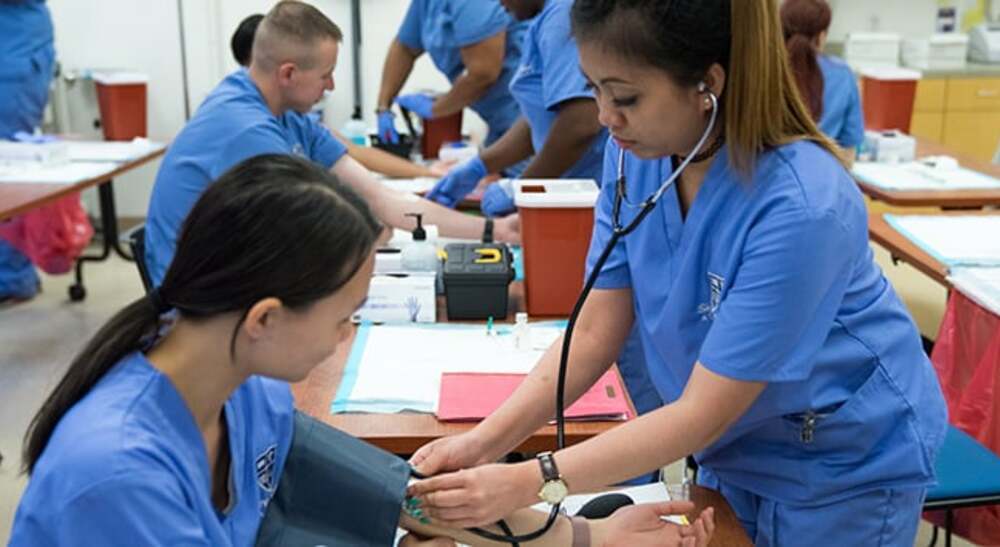Local Northeast Medical Institute CNA Courses Near Me Stamford: Your Path to Certification
Local Northeast Medical Institute CNA Courses Near Me Stamford: Your Path to Certification
Blog Article
Crucial Elements to Consider When Picking the Most Ideal Medical College Educational Program for You
Choosing the most fitting clinical school educational program is an essential choice that can greatly affect your academic trip and future occupation path. As aiming medical experts, the option of curriculum must align with your personal learning style and job ambitions.
Personal Learning Design

Medical colleges that use diverse mentor techniques and resources can fit numerous learning styles, cultivating a dynamic and inclusive educational setting. Inevitably, comprehending individual learning preferences equips pupils to make informed choices regarding their medical education and learning, establishing a solid foundation for their future jobs in healthcare.
Occupation Purposes Alignment

In addition, straightening occupation goals with the medical school curriculum can additionally improve motivation and engagement throughout the instructional journey. When students see the straight significance of their coursework to their future profession, they are more probable to remain committed and focused to their studies. As a result, when selecting a medical school educational program, it is important to thoroughly take into consideration exactly how well it straightens with one's profession purposes to guarantee a successful and meeting specialist course.
Training Methodologies
Thinking about the placement of occupation purposes with the chosen clinical school educational program, an examination of the mentor methodologies utilized comes to be important in forming the learning experience. The performance of a clinical school educational program greatly relies on the mentor techniques utilized by the institution. Different mentor approaches, such as lectures, small seminar, problem-based learning, simulation-based training, and hands-on medical experience, can substantially influence exactly how well pupils maintain and grasp information.
Simulation-based training enables trainees to practice clinical abilities in a regulated atmosphere before interacting with genuine people. Hands-on clinical experience provides a firsthand understanding of patient treatment and medical practices.
When picking a clinical institution educational program, striving students need to think about the teaching techniques utilized to ensure that their understanding preferences and strengths line up with the academic approach of the establishment.
Educational Program Flexibility
When evaluating clinical institution programs, assessing the extent of educational program versatility is crucial for possible trainees seeking a tailored educational experience. Curriculum flexibility describes the degree to which trainees can customize their understanding paths within the medical college curriculum. A curriculum that supplies versatility allows trainees to pursue their passions, concentrate on areas where they require much more assistance, and engage in learning experiences that line up with their career objectives.

Prospective medical pupils ought to take into consideration how a medical college's educational program flexibility lines up with their learning preferences, job goals, and individual link objectives. By choosing a program that uses the right balance of framework and adaptability, trainees can enhance their instructional experience and prepare themselves for successful careers in medication.
Scientific Direct Exposure Opportunities
Checking out the functional application of medical expertise, professional direct exposure possibilities play a vital function fit an extensive medical education. These opportunities give trainees with vital hands-on experience in real health care setups, enabling them to bridge the void between theory and technique. When thinking about medical college curricula, the quality and amount of clinical direct exposure should be carefully reviewed.
Efficient medical direct exposure ought to supply a varied range of experiences throughout various specializeds, guaranteeing that pupils are exposed to various medical circumstances and client demographics. Exposure to outpatient centers, inpatient wards, medical movie theaters, and emergency divisions can help pupils develop a well-shaped understanding of different elements of healthcare distribution. Additionally, chances for community-based care and interactions with underserved populations can cultivate a deeper appreciation for the social components of health.
Additionally, the visibility of supportive faculty and coaches throughout these clinical experiences can significantly enhance the discovering procedure. Professors guidance and useful comments can aid students reflect berkeley llm on their scientific experiences, recognize areas for improvement, and boost their decision-making capabilities and professional abilities (Northeast Medical Institute CNA Classes Near me Stamford). Overall, robust scientific direct exposure opportunities are vital for preparing future medical professionals to deliver top quality person treatment effectively
Final Thought
Finally, when picking a medical college curriculum, it is necessary to consider your individual learning style, alignment with most difficult courses in the world according to harvard career objectives, teaching methodologies, curriculum flexibility, and professional direct exposure possibilities. These aspects play a crucial duty in establishing one of the most suitable program for your specialist and academic development. Ensure to extensively review each element to make a notified decision that will certainly best support your growth in the clinical field.
Understanding one's personal discovering style is essential when picking a medical school curriculum. By recognizing one's learning design early on, aspiring medical trainees can purposefully select a curriculum that provides to their staminas, ultimately boosting their knowing experience and academic success.
When assessing medical institution programs, evaluating the level of curriculum flexibility is crucial for potential pupils seeking a customized academic experience. Educational program versatility refers to the level to which trainees can individualize their knowing courses within the medical institution educational program.In final thought, when picking a medical institution educational program, it is vital to consider your individual learning design, alignment with profession purposes, instructing techniques, curriculum versatility, and professional exposure chances.
Report this page